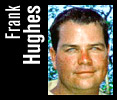
| Sunday, December 12
By Frank Hughes
Special to ESPN.com |
|
SALT LAKE CITY -- It's no secret that once John Stockton and Karl Malone call it quits, the
storied era of the Utah Jazz is going to end.
|  | | What will happen to the Jazz when Karl Malone leaves? |
Apparently, every facet of this Jazz team will end.
According to several league sources, Utah owner Larry Miller is going to sell
the franchise, perhaps as soon as in two years, when Stockton's contract has
expired and the Jazz no longer will be a factor in the race for the Western
Conference title.
Miller did not return several phone calls to his offices, but the
prevailing theory, according to the sources, is that Miller is going to sell
the team to Jon Huntsman, the wealthiest man in Utah and the namesake of the
Huntsman Corp., a $5 billion-a-year chemical manufacturer based in Salt Lake
City.
However, one of the sources said that while Huntsman is the first in line
to purchase the team, "It wouldn't surprise me if he sold it to somebody
else."
The sources say that Miller has tied his tenure of the Jazz, which he has
owned for 15 years, with the careers of Stockton and Malone, and to a lesser
degree Jeff Hornacek.
Hornacek is retiring after this season. Stockton, in his 15th season, is
signed through the 2001-2002 season. And Malone, in his 14th season, is
signed through the 2002-2003 season.
If Miller sells the team after Stockton's retirement in 2002, it would
mean Malone would finish out the remainder of his four-year, $67 million
contract by himself.
Malone could not be reached for comment, and his agent, Dwight Manley, did
not return several phone calls to his office.
Miller also owns the Delta Center, where the Jazz play, as well as the
television station KJZZ, which televises Jazz games. In a recent Forbes
article, the Jazz were estimated at a worth of $215 million, eighth in the
league. However, Forbes estimated that while the Jazz generated revenue of
$47.7 million last season, the team lost $700,000.
Huntsman, according to Fortune 500 Magazine, is one of the nation's Top 25
philanthropists, and is one of the University of Utah's biggest boosters. The
arena where the Utah men's basketball team plays is named the Huntsman Center.
The thought, according to sources, is that if Huntsman actually buys the
team, he will ask Utah coach Rick Majerus to coach the Jazz. Current Utah
coach Jerry Sloan's contract expires after the 2000-2001 season.
One source said Majerus has declined several offers from NBA teams because
he knows he has a job waiting for him in Utah once Miller sells the team to
Huntsman.
But a source close to Majerus said that while he has considered the option
of coaching for the Jazz once Huntsman takes over, he may decline in the
future because of health concerns.
Majerus, who lives in a hotel next to the university campus, is obese, and
friends say he has no interest in losing the additional weight he is carrying.
But Miller has to be careful about whom he sells the team to, because his
primary revenue source is his 38 car dealerships, and if he makes Utahns
angry by selling the team to an owner who is controversial, or is not willing
to spend money to win, the backlash against Miller's other businesses could
be devastating.
Worse, if Miller sells the team to an owner whose intentions are to move
the franchise to a larger market, Miller may never be forgiven. He already
sold an IHL hockey team that later became the Detroit Vipers, and there was
an anti-Miller contingent of fans then who were calling for the public to
boycott Miller's car dealerships.
Then-owner Sam Battistone was considering moving the team when Miller
bought it from him outright in 1985.
But owning an NBA team in the league's smallest market could be a
financial strain for whomever takes over the franchise. Television revenue in
Salt Lake City, which under normal circumstances account for about 40 percent
of a team's overall revenue, is far less than average because of the city's
population.
Already, the Jazz are not selling out the Delta Center as the team has
struggled to an 11-7 record, far less than Jazz fans have become accustomed
to in recent seasons.
And the attendance likely will only slip further when Malone and Stockton
retire because the Jazz do not have the basis for a strong future, and it is
difficult to convince top-notch free agents to move to Salt Lake City, a city
infamous for its adoption of strict Mormon principles.
In recent seasons, Derek Harper and Rony Seikaly have refused to report to
the Jazz after they were traded from their respective teams.
Frank Hughes covers the NBA for the Tacoma (Wash.) News-Tribune. He is a regular contributor to ESPN.com. |  |

 Fouled Out: GP needs to grow up
Fouled Out: GP needs to grow up
